GG: The key moment is the 1933 Montevideo Pan-American Conference, which you’ve written about as well. These conferences had always been a venue where Latin Americans inevitably demanded Washington give up the right to intervention, while Washington’s envoys inevitably ignored such demands. This time, though, things were different. FDR sent Cordell Hull, his secretary of state, to represent the United States. Hull was a free trader who had come to see non-intervention as the political equivalent of laissez-faire. There are many reasons why he makes this equation, but in Montevideo, he basically completely capitulates to Latin America’s vision of international law, both giving up the U.S. right of intervention—which for Latin Americans means voiding the doctrine of conquest—and recognizing the absolute sovereignty of all nations no matter their size. The goodwill that Hull generates with this turnaround can’t be underestimated. I go into it in the book, but Hull is hailed as the “unconquering” hero upon his return to the United States, with FDR pushing through legislation giving Hull the power to negotiate reciprocal tariff treaties.
At this point, the New Deal was under siege. FDR was still popular, but the first phase reforms had stalled, and the hard, corporate-funded right was mobilizing, including the quasi-fascist Liberty Leagues. There’s a surge in anti-labor violence and the spread of extremist voices on the new technology of radio. It’s difficult to quantify, but Hull’s ability to lower tariffs and open Latin American markets wins back many of the economic elites that FDR had lost. And there begins—and here I’m building on the work of the sociologist Thomas Ferguson—the coalescing of a corporate bloc that didn’t mind domestic reform as long as it was accompanied by the opening of foreign markets. The corporate core of the Republican Party was disintegrating, with some stalwart industries, such as oil, chemicals (though not the DuPonts), and banking (though not J. P. Morgan) defecting to the Democrats. Newer financial houses run by Jewish bankers, such as Lehman Brothers, threw in with FDR, in the hope of breaking the hold the Protestant banking establishment had over the financial system. These industries were swayed by Roosevelt’s and Hull’s promise to build the kind of legal infrastructure that would allow their expansion overseas.
Hull’s trade policies, made possible by his actions in Latin America, also helped tie back together Roosevelt’s fraying coalition of elite supporters. James Warburg, a German-born banker and early adviser to FDR, had broken with the president over monetary policy and published Hell Bent for Election, a scorcher of a book that sold hundreds of thousands of copies and decried the country’s drift toward tyranny and socialism. “Almost anyone would be better than Roosevelt,” Warburg wrote. His criticisms were unrelenting, and Hearst papers seemed to run them in every edition. Unrelenting until he relented. In October 1936, Warburg wrote a long trade policy love letter to Hull, announcing that he was, after all, voting for Roosevelt.

